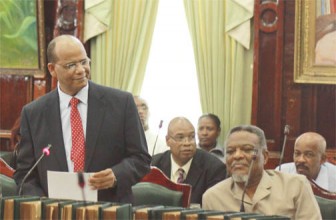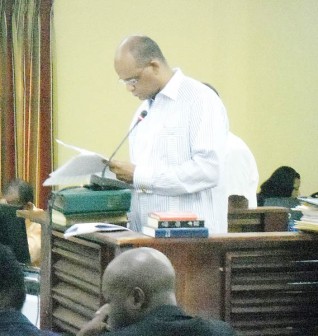Earlier this year – after the police killings at Linden and Agricola – was not the first time that Rohee’s suitability for ministerial office had been raised. His appointment as Foreign Minister in the Cheddi Jagan 1992 Cabinet had generated a tirade of criticism from the political opposition, the argument being that a man with strictly limited intellectual credentials was ill-suited to serve as the country’s Foreign Minister. Thereafter, the opposition People’s National Congress (PNC) under Desmond Hoyte made it a point of duty to make Rohee’s ministerial life miserable, targeting him publicly at every opportunity. He became the butt of an assortment of jokes associated mostly with what was touted as his lack of knowledge of foreign policy issues.

If Rohee himself sometimes appeared rattled by the criticism it never seemed to shake the PPP’s faith in him. In fact there exists a case for saying that it eventually became apparent to the PNC that Rohee was, after all, a permanent fixture in the PPP/C government and that no amount of taunting and targeting would move him. In fact, his eventual removal from the Foreign Ministry post came only after the 2000 de-bacle of the Surinamese gunboat eviction of the CGX Oil Rig from the Corentyne River.
Even then he was not cast aside ignominiously. His tenure as Foreign Trade Minister is only barely significant in the context of the point which this commentary seeks to make. Suffice it to say that a place had to be found for him in the PPP’s political setup and as it turned out the Foreign Trade appointment turned out to be a holding position.
There are those who contend that Rohee was a ‘natural fit’ at the Home Affairs Ministry; that the post fitted in with the tough, non-nonsense persona which he had sought to cultivate over the years as a diligent disciple and foot soldier of the PPP. Then there are those who contend that coming in the wake of the Gajraj Death Squad scandal the Home Affairs portfolio was a ‘basket’ in which to fetch water. Rohee opted for hauling himself up to his full height, assuming the sternest countenance he could muster and jumping into the job, feet first. What happened afterwards was clear for all to see. The erosion of the image of the Force which had began long prior to Rohee becoming Home Affairs Minister continued. The loss of control over crime became more acute as public trust and confidence in the police continued to sink. From inside the Force came claims of rogue cops who focused on shakedowns, security and protection rackets, control of drug houses and blocks and outright heists that targeted mostly gold-mining operations. All this, frankly, appeared way beyond a man who had worked hard to cultivate a ‘tough guy’ image but who, nonetheless, knew little about the complexities of managing public safety. What also did not help Mr Rohee was the emergence of the new genres of crime that had preceded his arrival at the Home Affairs Ministry and, subsequently, the high-profile political drama that coincided with the tenures of Police Commissioners Winston Felix and the now deceased Henry Greene.

If the long knives continued to be out for Rohee, the handles of those knives were held by a weak political opposition and a divided group of civil society adherents whose calls for Rohee’s removal were based mostly on concerns over escalating crime and allegations of human rights violations by the Guyana Police Force. In the wake of the Linden and Agricola police killings and the subsequent political moves for him to be removed from the Home Affairs Ministry the government again comes out to bat for him, making it clear to the joint opposition that even its one seat majority in the National Assembly was not enough to bring about Rohee’s political downfall.
Interestingly, not even the most robust criticism of a Guyana Police Force now infested with corruption of one kind or another has ruffled Mr. Rohee. Indeed, he never appeared to trouble himself unduly to even defend the Force against its critics. Perhaps more significantly, the government’s resistance to calls for police reform appeared to suggest that they were more than happy with the job that Rohee was doing.
Recent occurrences have perhaps provided even clearer indications that it is Mr. Rohee’s party loyalty and not his performance as a Cabinet Minister that counts. The recent Linden protests might have been determined and intense and might have been prosecuted in a manner that compelled the government to pay attention. In the end, however, Rohee survived
The government’s position was understandable. More than that the party stalwart and Cabinet Secretary had outlined what appeared to be more or less a party position that it was ready to ‘rumble’ over Rohee. Perhaps if Rohee were a lesser party functionary, then his job as Home Affairs Minister might be up for grabs. The problem is that however much the PPP may behave to the contrary it is the party that is paramount and a decision to remove Rohee from the Ramotar Cabinet is certain to have implications for the tenor of the relationship between the PPP/C administration and the ruling People’s Progressive Party.





